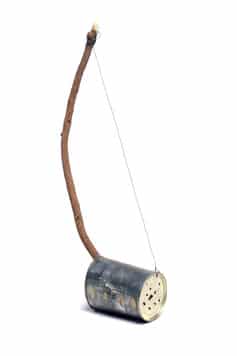Presented by Museum of the Peace Corps Experience and American University Museum
Basotho people, c. 1994
Maseru District, Lesotho
Metal can, stick, string, 10 x 21 x 3 in.
Collection, Museum of the Peace Corps Experience
Gift of Betty Hiebert, Lesotho, Ha Tlali 1993–95

I had planned to travel after retiring from a long career in elementary education. At age 63, I volunteered for the Peace Corps.
One of a group of 30 education volunteers sent to Lesotho in 1993, I served as a resource teacher in rural primary schools. I taught on a rotating basis at five different elementary schools, one of them a little mission school up in the mountains. I had to hike in along steep and rocky trails that turned slick when it rained and navigate a series of stepping-stones across a creek, with Doc Martens on my feet and a pack on my back. I’d spend the night on the mountain and hike out the next day.
The weak economy had taken its toll on Lesotho’s rural schools and attending was a privilege out of reach for many. Teenage boys, who under other circumstances might have been my students, wandered the hillsides, wrapped in colorful Basotho blankets, herding sheep or goats or cows. Herding was their contribution to their family’s source of wealth. What was the incentive to go to school?
If the country was poor, Lesotho has a rich heritage of music and dance. As small children, the Basotho learn their people’s songs and dances. I loved their movements and their beautiful harmonies, and they would perform for me at the drop of a hat. You would hear music everywhere—at home, in the village, at school, at church. The herd boys even had their own musical traditions to pass the time and calm their animals. They would sing and play the lesiba, a stringed wind instrument, and the mamokhorong, something like a one-string violin played with a bow made from cow or horse hair.
The students would bring their instruments to school to practice and for show-and-tell. One boy let me buy this mamokhorong he’d made out of a can, a piece of wood, and a wire. I was fascinated by the handcraft, by their ingenuity, how they made things out of nothing. To have so little and to be so proud—they didn’t want you to see the hard part. The music was a gift, something they could give to me.
I’ve been back four times. My friends here have donated money for libraries and tuition. Now we’re supporting a soup kitchen that my friend is setting up in her village. It’s been a big part of my life.
The Committee for a Museum of the Peace Corps Experience is a 501(c)(3) private nonprofit organization. Tax ID: EIN # 93-1289853
The Museum is not affiliated with the U.S. Peace Corps and not acting on behalf of the U.S. Peace Corps.
Museum of the Peace Corps Experience © 2024. All Rights Reserved.